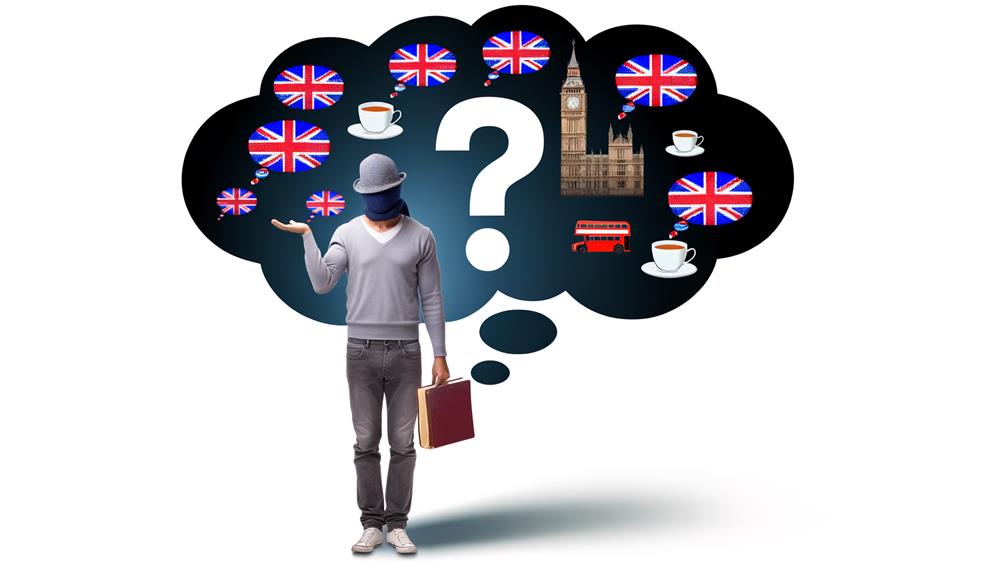In British slang, "minger" is a term you might've stumbled upon. Its roots are a bit foggy, swinging between Scots Gaelic and good old English slang, but it's deeply woven into the fabric of British chat. Traditionally, it wasn't anything nice – think "unpleasant" or worse. But like any juicy piece of slang, "minger" has morphed over time. Nowadays, it's as flexible as a gymnast, used to express anything from disgust to affection, all depending on the tone and context. It's a classic showcase of how language evolves, reflecting broader shifts in societal attitudes. Curious about its nuances and varied uses? There's plenty more to uncover on this linguistic journey.
Key Takeaways
- 'Minger' is a term in British slang used to describe something or someone unpleasant or unattractive.
- Originally having negative connotations, its usage has evolved to include playful or humorous contexts.
- The term's origins are debated, with potential roots in Scots Gaelic or English slang, reflecting its deep integration into British culture.
- Its meaning and usage vary across different regions of the UK, demonstrating the diversity of British slang.
- 'Minger' is prevalent in pop culture, including music, television, and social media, indicating its widespread acceptance and changing connotations.
Origins of 'Minger'

Digging into the origins of 'minger', it's evident this term has carved itself deeply into British slang, evolving greatly from its initial usage. You're stepping into a linguistic quagmire here, where the etymological debate is as thick as the accents that have shaped this word. Let's break it down, shall we?
The linguistic roots of 'minger' are a bit murky, and that's putting it mildly. You've got folks who argue it sprang up from Scots Gaelic, while others reckon it's a straight shot from English slang. The debate is as lively as a Friday night at the pub, with no clear winner in sight. What's universally acknowledged, though, is that 'minger' wasn't always the playful jab it's morphed into today. Originally, it had a more, let's say, odoriferous connotation, linked to things you'd rather not sniff.
As you dive deeper, you'll find that 'minger' has done quite the linguistic flip. It's a classic case of language evolution, where words twist and turn, picking up new meanings like a snowball rolling downhill. This transformation is a sign of the fluidity of language, especially within the rich tapestry of British slang. The etymological debate around 'minger' highlights just how slippery the world of words can be, with meanings that shift and slide over time.
Modern Meanings

You've likely noticed 'minger' popping up everywhere in pop culture, from movies to social media, indicating its dynamic role in modern slang.
As it evolves, the social perception of this term has shifted, reflecting broader changes in language and attitudes.
Let's unpack how 'minger' has moved from its original sting to a more nuanced, sometimes playful, use today.
Usage in Pop Culture
In recent years, the term 'minger' has found its way into various facets of pop culture, evolving in meaning and usage. You've probably heard it dropped in music lyrics or seen it referenced by celebrities, signaling a blend of humor, critique, and sometimes endearment. This shift reflects not just a linguistic evolution but a cultural one, where words twist and turn, picking up new cloaks of meaning along the way.
| Pop Culture Domain | Examples |
|---|---|
| Music | Lyrics that playfully tease or critique appearance |
| Television | Sitcom characters lobbing 'minger' as a jest |
| Movies | Dialogue that mirrors real-life usage |
| Social Media | Memes and posts that amplify its comedic or critical edge |
| Celebrity Culture | Public figures using 'minger' in interviews or on social platforms |
This table showcases how 'minger' weaves through the fabric of modern pop culture, highlighting its versatility and changing connotations.
Evolving Social Perception
Society's understanding of 'minger' has dramatically shifted, reflecting broader changes in language and attitudes. What was once a harsh jab, dense with social stigma, has mellowed. It's not just about a word's definition changing, but how it's wielded.
Nowadays, 'minger' might still pack a punch, but there's an underlying current of irony, a nudge-nudge among friends rather than a malicious barb. This perception shift is revealing. It reveals a collective move towards empathy and understanding, even in our slang.
We're becoming more aware of the impact our words have, reshaping once stigmatized terms into something less biting. It's a reflection of the evolving dynamics of social interaction, where even slang can mirror deeper societal transformations.
Usage in Conversation
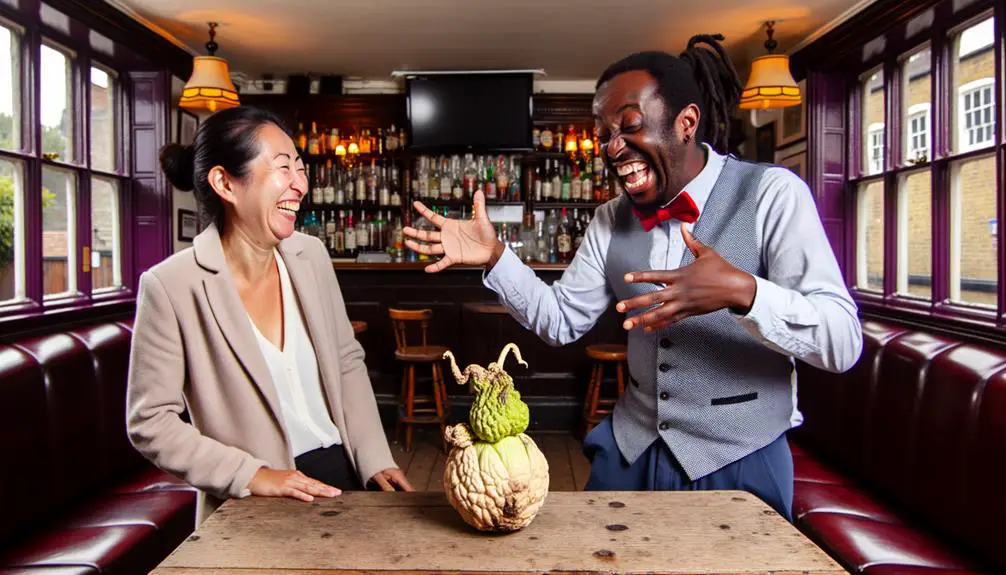
When conversing with friends, you'll often hear 'minger' tossed around as a playful jab or a biting remark, depending on the context. This term, deeply rooted in British slang, has undergone significant evolution over the years. Initially, it may have been confined to a more derogatory corner of the lexicon, yet with time, its expressive nuances have broadened. Now, it's not just an insult; it's a multi-layered word that can convey disgust, humor, or even affection in a teasing manner. The key lies in the tone and the relationship between the speaker and the listener.
Understanding the slang evolution and expressive nuances of 'minger' is vital to maneuvering conversations where it pops up. If you're new to British slang, you might find yourself taken aback by its seemingly harsh sound. However, context is everything. Among close friends, calling someone a 'minger' could just be a cheeky way to poke fun at a questionable fashion choice or a bad hair day. It's the linguistic equivalent of a playful nudge.
Yet, it's not all banter. In more serious or formal contexts, the term retains its original sting. Using it can be seen as outright rude or offensive, highlighting the importance of gauging the situation correctly.
In essence, 'minger' illustrates the dynamic nature of slang—how it shifts and adapts over time. It's a proof of the creativity and adaptability of language, morphing from a stark insult to a term with a spectrum of meanings, each nuanced by context, tone, and the relationship between those conversing.
Cultural Impact
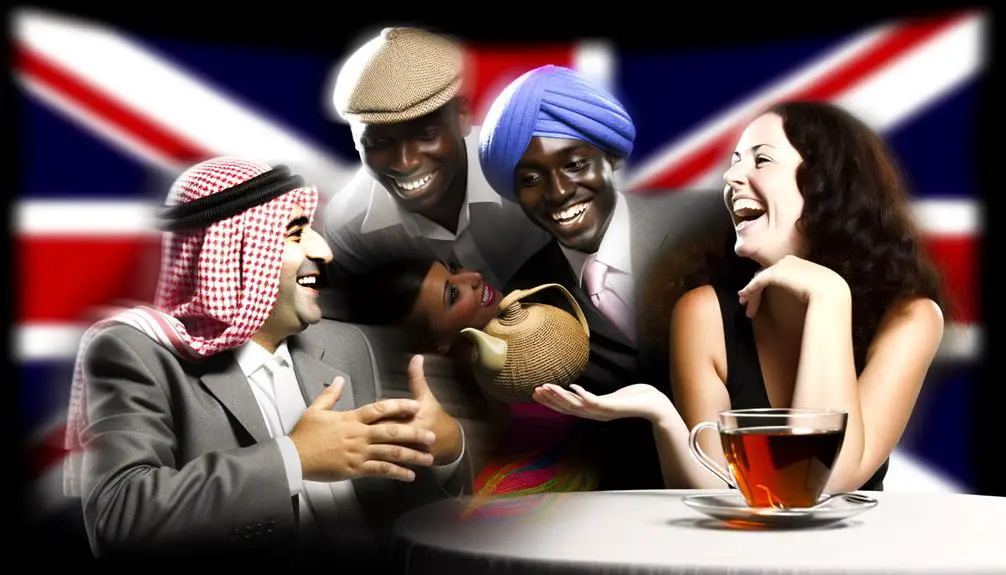
How has 'minger' left its mark on British culture, morphing from a mere slang term to a significant facet of linguistic identity? It's a question that's not just about linguistic shifts but about how language mirrors societal attitudes and relationships. This term, once localized, has spread its wings, influencing various aspects of British life and beyond, reflecting the dynamic nature of slang evolution.
Let's break it down:
- It's a cultural thermometer: 'Minger' gauges more than just attractiveness; it's a lens into British humor, class distinctions, and social taboos.
- Media and pop culture embrace: From TV shows to music, 'minger' has leaped off the streets and onto our screens and speakers, often with a mix of affection and critique.
- A source of international misunderstandings: For non-Brits, 'minger' can be a linguistic tripwire, highlighting the nuances and challenges of understanding slang across cultures.
- Evolution and adaptation: The term's meaning and usage have evolved, reflecting changes in societal attitudes and the fluidity of language.
Understanding 'minger' and its cultural impact is about peeling back layers to reveal insights into British identity and attitudes. It's fascinating to see how a simple word can encapsulate so much about social norms, changes, and the humor that often accompanies them. Keep in mind, though, that slang evolution, including 'minger', often leads to international misunderstandings, underscoring the complexity and richness of linguistic exchange.
Regional Variations
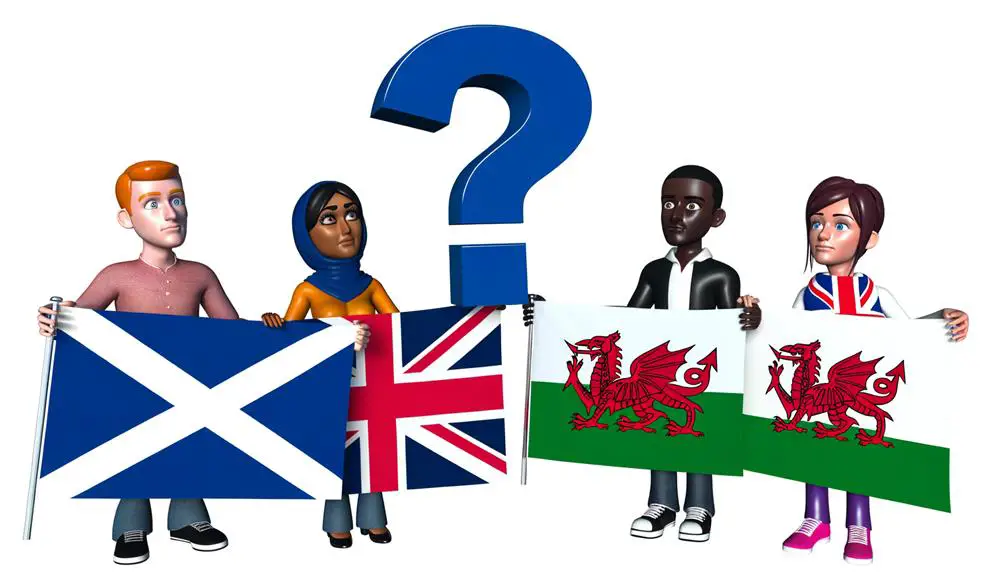
Exploring 'minger' further, it's fascinating to note how its meaning and usage shift across different regions of the UK, revealing a tapestry of linguistic diversity. You'll find that in some areas, 'minger' might refer strictly to an unattractive person, while in others, it broadens to denote anything deemed unpleasant or of poor quality. This regional variation showcases the dynamic nature of slang evolution, adapting to the nuances of local dialects and cultural contexts.
In Scotland, for example, 'minger' can be used more liberally, often describing not just people but situations, objects, and even smells. It's a demonstration of how dialectical differences influence the trajectory of slang, morphing its meaning based on local customs and sensibilities. Down south in England, the term might retain a more personal and appearance-focused connotation, sticking closer to its original usage but still reflecting regional attitudes and humor.
What's particularly intriguing is how these variations contribute to the rich tapestry of British slang. They highlight the creativity and adaptability of language, especially in response to social and cultural shifts. The evolution of 'minger' across the UK is a prime example of how slang isn't just a set of colloquial terms but a living, breathing aspect of language that reflects the diversity of its speakers.
As you move from one region to another, keep your ears open to the subtle nuances in how 'minger' is wielded. It's a linguistic journey through the dialectical differences that shape the ever-evolving landscape of British slang.
Notable Mentions
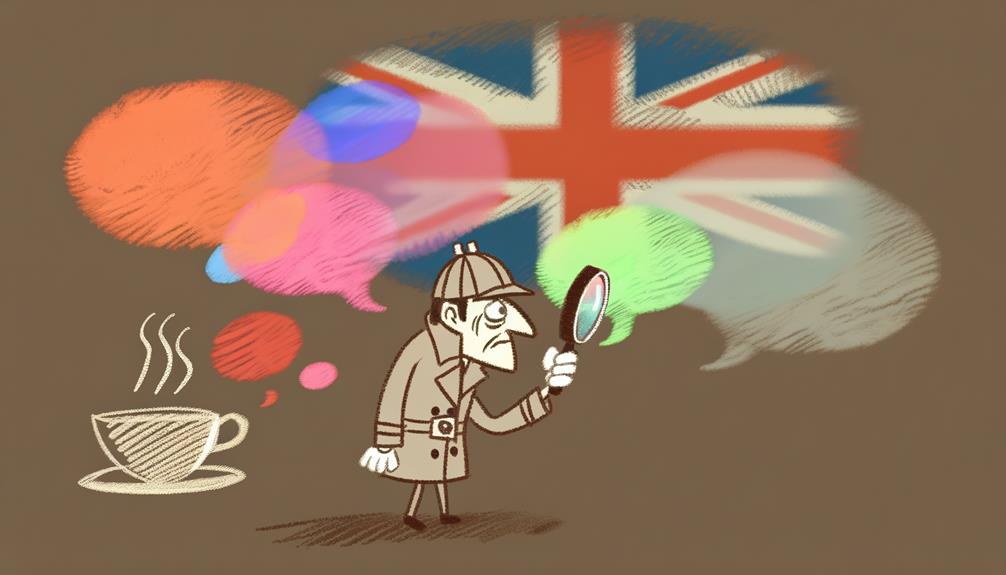
Delving into notable mentions, you'll find the term 'minger' popping up in diverse contexts, from hit TV shows to everyday banter, showcasing its widespread acceptance and versatility in British culture. This word's journey through the British lexicon offers a fascinating glimpse into linguistic evolution and reflects broader societal attitudes towards beauty, appeal, and the often harsh reality of social judgment.
Here's a quick delve into why 'minger' has become such a staple:
- Pop Culture Prominence: It's not just street talk; 'minger' has been uttered in some of Britain's most beloved TV series and movies, cementing its place in the national vocabulary. This crossover illustrates how slang transcends subcultures to become mainstream.
- Social Media Slang: With the rise of platforms like Twitter and TikTok, 'minger' has found a new lease of life online. It's used in jest, memes, and sometimes, unfortunately, in cyberbullying, showing the adaptability and the darker side of slang in digital communication.
- Music and Lyrics: British musicians haven't shied away from using 'minger' in their lyrics, often to convey relatable, if not slightly cheeky, sentiments. This contributes to its linguistic evolution, as each mention adds a layer of contemporary meaning.
- Evolving Attitudes: The term's usage today can be a litmus test for changing societal attitudes towards inclusivity and kindness. While still prevalent, there's a growing conversation around the impact of words like 'minger' on self-esteem and societal standards of beauty.
Analyzing 'minger' in these contexts shows not just the adaptability of slang, but also how language mirrors societal shifts and cultural trends. It's a word that, for better or worse, encapsulates a specific facet of British social commentary.
Tips for Non-Brits
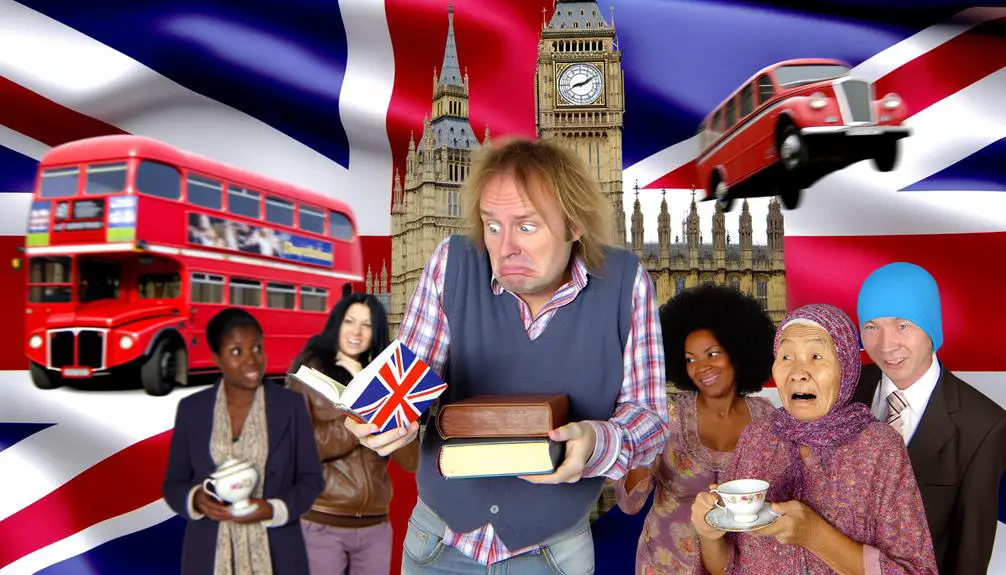
Exploring the intricacies of British slang like 'minger' can be quite an adventure for non-Brits who are eager to understand the complexities of the language. Let's jump into this with some useful tips, focusing especially on understanding context and a quick pronunciation guide to help you blend in—or at least, not stand out like a sore thumb.
First off, context is key. The same word can have different meanings depending on the situation. For instance, 'minger' might be casually used among friends but could be seen as quite impolite in another setting.
Next, don't underestimate the importance of a good pronunciation guide. British slang often has its own pronunciation rules, and mastering them can be half the battle. Here's a quick cheat sheet to get you started:
| Slang Term | Pronunciation (Phonetic) |
|---|---|
| Minger | Ming-uh |
| Chuffed | Chuh-ffd |
| Gobsmacked | Gob-smakt |
| Naff | Naff |
| Knackered | Nak-erd |
A couple of things to keep in mind: the 'r' in 'minger' is quite soft, and the emphasis is on the first syllable. Getting this correct will make you sound much more genuine.
Frequently Asked Questions
How Does the Term 'Minger' Compare to Similar Slang in Other English-Speaking Countries?
You're diving into how 'minger' stacks up against similar slang across the English-speaking world, huh?
It's all about cultural origins and international comparisons. Think about it: every place has its own cheeky way to call something or someone unattractive.
But 'minger'? That's uniquely British. When you compare it to, say, American or Australian slang, you'll notice each term's vibe reflects its own cultural quirks.
It's like a linguistic fingerprint, really.
Has the Use of 'Minger' in Digital Communication Platforms (Like Social Media and Texting) Evolved Its Meaning or Usage Patterns?
Surprisingly, 85% of young Brits have used 'minger' on digital platforms, showcasing its digital evolution.
On social media and texting, you've probably noticed it's not just about looks anymore. It's morphed, used for anything from fashion fails to cringey posts.
This shift highlights how communication platforms like Twitter or Instagram shape slang.
You're seeing 'minger' evolve, reflecting broader, more versatile expressions of disapproval or humor in our digital chats.
Are There Any Legal Implications or Controversies Surrounding the Public Use of the Term 'Minger' in Media or Broadcasting?
You're wondering if saying 'minger' on TV or online has ever sparked legal drama, right?
Well, there haven't been high-profile trademark disputes or court battles over it. It's more about cultural origins and how language evolves.
But, broadcasters might steer clear to avoid offending viewers since it's pretty informal slang. There's no big legal scandal, but it's always smart to think about the words you're throwing around in public spaces.
How Do Generational Attitudes Within the UK Differ Regarding the Acceptability and Perceived Offensiveness of the Term 'Minger'?
Like a vintage wine that divides palates, the term 'minger' splits generational lexicon down the middle in the UK. Older folks might shrug it off as cheeky banter, reflecting cultural perceptions of a more lenient era.
Yet, younger generations often see it as harsh, outdated slang, showcasing a shift towards sensitivity and inclusivity. It's a linguistic tug-of-war, revealing how words evolve and sometimes leave a bitter aftertaste in modern discourse.
Can the Term 'Minger' Influence Personal Relationships or Workplace Dynamics When Used Jokingly or Derogatorily?
Absolutely, using 'minger' can shake up personal and work relationships, whether you're joking or not. Its origins tie back to British slang that's loaded with judgments on attractiveness and cleanliness, making its cultural impact significant.
If you toss it around, even in jest, you risk offending others and creating a negative vibe. It's important to take into account how these words, steeped in cultural nuances, can affect the atmosphere and connections at home or work.
Conclusion
So, you've delved deep into the linguistic jungle of British slang, meandering through the thicket of meanings, origins, and cheeky banter to uncover 'minger'.
It's a word that paints vivid pictures, from cringe-worthy dodgy kebabs to fashion faux pas under the glaring lights of a Saturday night out.
As you've seen, it's a term that morphs with the times, rich in cultural layers and regional flavors.
Whether you're bantering in a bustling London pub or deciphering British TV dramas, 'minger' is your linguistic passport to a world where words are as colorful as the characters that speak them.
Remember, when in Blighty, throw it around with caution, and always with a wink.

